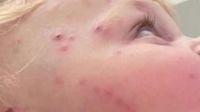Families across the United Kingdom are set for a significant change in children’s healthcare: starting January 2026, the National Health Service (NHS) will offer a free chickenpox vaccine to all eligible children. This landmark move, confirmed by the UK Health Security Agency (UKHSA), marks the first time that protection against chickenpox will be included in the country’s routine childhood immunisation programme—an addition not seen since the MenB vaccine was introduced in 2015, according to BBC News and The Independent.
The vaccine, known medically as the varicella jab, will be administered as part of a new combined immunisation called the MMRV vaccine. This shot covers measles, mumps, rubella, and now varicella (chickenpox), replacing the current MMR vaccine for babies at 12 and 18 months. As Sky News reports, the rollout will begin in England, Wales, and Northern Ireland in January, with Scotland expected to follow, though no specific date has been set. The vaccine is already part of the childhood schedule in countries like the United States, Canada, Australia, and Germany, where it has a proven record of safety and effectiveness.
Until now, families in the UK seeking chickenpox protection had to pay around £150 for the vaccine privately—a hefty sum for many. With the NHS rollout, the jab will be free, and the government expects to protect around 500,000 children every year. The UKHSA stated that the vaccine provides about 98% protection in children and roughly 75% in adults after two doses, with no need for further boosters. The Joint Committee on Vaccination and Immunisation (JCVI) recommended in 2023 that babies receive two doses for optimal protection.
Chickenpox, caused by the varicella zoster virus, is a highly contagious disease most often affecting children. Symptoms usually begin with a fever and general malaise, followed by the telltale itchy, spotty rash that can cover the entire body—even inside the mouth. While most cases resolve within a week or two without complications, the illness can sometimes lead to severe issues such as bacterial infections, pneumonia, and, in rare cases, brain inflammation.
The gravity of these complications was underscored by the story of Ari, a six-year-old boy whose chickenpox infection spread to his brain—a rare but life-threatening scenario. His mother told Sky News, “You don’t even realise how dangerous it actually can be—his doctor turned around and said he was basically a one in 22,000.” She added, “When I see people saying it’s not dangerous, you need to have chickenpox parties, it’s not funny. They don’t realise how dangerous it can be, that it can kill your child.” Ari’s case had a happy ending, but only because he received hospital care just in time. “If he had gone [to hospital] the next day, he would have died. He was really lucky,” she said. On the vaccine, she remarked, “It should have been done years ago. If they can prevent it, they should do.”
Dr. Gayatri Amirthalingam, deputy director of immunisation at the UKHSA, echoed the importance of this move. “Most parents probably consider chickenpox to be a common and mild illness, but for some babies, young children and even adults, chickenpox can be very serious, leading to hospital admission and tragically, while rare, it can be fatal,” she told The Independent. She called the wider rollout “excellent news,” adding, “We now have extensive experience from a number of countries showing that the vaccine has a good safety record and is highly effective. The programme will have a really positive impact on the health of young children and also lead to fewer missed nursery and school days.”
The vaccine’s integration into the NHS schedule is expected to be straightforward for parents: as with the current MMR vaccine, general practitioners (GPs) will invite families to bring their children for the jab. All children born after January 1, 2026, will be eligible, and GPs will contact parents about eligibility for those under 12 months as the programme rolls out. There will also be a “catch-up” element for children up to age six who have not previously had chickenpox, as explained by Rachel Spiers, Immunisation and Vaccination Programme Manager at the Public Health Agency (PHA) in Northern Ireland. She assured families that “if a child has already had their MMR vaccine, it is completely safe to get another MMRV dose.”
Health officials stress that the new vaccine will not only prevent illness in children but also reduce the burden on parents and the healthcare system. Mike Nesbitt, Northern Ireland’s Health Minister, stated, “We are empowering parents to safeguard their children against chickenpox and its potentially serious complications with a vaccine, which has been proven safe and effective in other countries across the world.” He highlighted the benefits for families, noting that the vaccine “will reduce school and nursery absences, while supporting parents by minimising the need for time off work to care for sick children.”
Professor Sir Michael McBride, Chief Medical Officer, urged parents to take up the offer when invited: “Immunisation is one of the most effective ways of preventing illness from infectious disease. I encourage parents and guardians of those eligible to avail of the vaccination, when invited to do so, to help protect their children from this disease.”
The rollout comes at a critical time, as figures from the UKHSA show that uptake rates for childhood vaccines in England have been declining. Last year, only 91.9% of five-year-olds had received one dose of the MMR vaccine—the lowest level since 2010/2011. Just 83.7% had received both doses, also a record low since 2009/10. Public health officials hope that the addition of the chickenpox vaccine will help reverse this trend and boost overall immunisation rates.
The NHS chickenpox vaccine rollout is based on robust scientific advice and international experience. The Department of Health (DoH) noted that the decision follows research showing the significant impact of severe chickenpox on children’s health, hospital admissions, and associated costs. The eligibility criteria for the new vaccine will be detailed in clinical guidance to ensure the most effective protection for children.
For many UK families, this change will mean peace of mind and, perhaps, a few less days spent nursing itchy, feverish children at home. As Dr. Amirthalingam put it, “It is excellent news, that from next January, we will be introducing a vaccine to protect against chickenpox into the NHS routine childhood vaccination programme—helping prevent what is, for most, a nasty illness and for those who develop severe symptoms, it could be a lifesaver.”
The addition of the chickenpox vaccine to the NHS routine schedule marks a major step forward in public health, offering British children and their families protection that has long been available in other countries. The hope is that, with widespread uptake, severe cases of chickenpox—and the anxiety they bring—will soon become a thing of the past.






